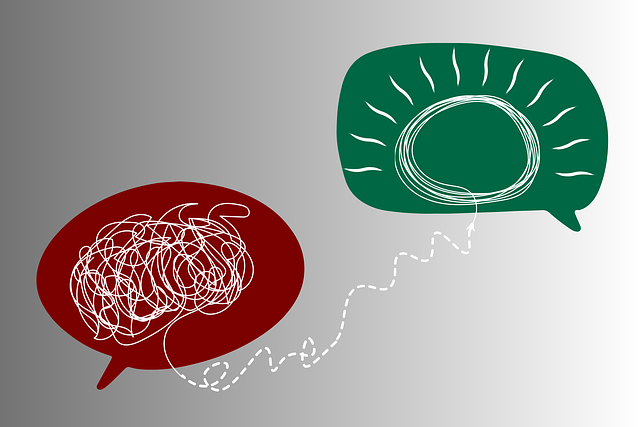Emotional intelligence (EQ), crucial for personal and professional success, is enhanced by Westminster Gender-Affirming Care Therapy (WGACT) through holistic approaches. WGACT integrates EQ development into therapy, focusing on self-awareness, management, and empathy towards others. Using cognitive-behavioral strategies, mindfulness exercises, and group discussions, they foster understanding of complex emotions related to gender identity. Their techniques, like meditation and journaling, improve emotional response management and prevent burnout in healthcare providers. WGACT's innovative practices not only benefit individuals but also enhance mental health policy analysis and advocacy by cultivating empathy and self-care, fostering deeper connections and effective communication.
Emotional intelligence (EI) is a powerful tool for personal growth and relationship building. This article explores the concept of EI, highlighting its numerous benefits across various aspects of life. We delve into innovative approaches like Westminster Gender-Affirming Care Therapy, offering holistic methods for EI development. Additionally, we provide practical strategies to enhance self-awareness, self-management, empathy, and social skills, crucial components for effective communication and fostering meaningful connections.
- Understanding Emotional Intelligence and its Benefits
- Westminster Gender-Affirming Care Therapy: A Holistic Approach to EI Development
- Strategies for Enhancing Self-Awareness and Self-Management
- Building Empathy and Social Skills for Effective Communication
Understanding Emotional Intelligence and its Benefits

Emotional intelligence (EQ) is the ability to recognize, understand, and manage our own emotions, as well as perceive, interpret, and respond appropriately to the emotions of others. It’s more than just empathy or social skills; it’s a crucial set of competencies that can profoundly impact various aspects of life, from personal relationships to professional success. For individuals navigating complex emotional landscapes, Westminster Gender-Affirming Care Therapy offers a unique approach, integrating EQ development into therapeutic practices to foster deeper self-awareness and interpersonal connections.
Beyond its benefits in personal growth and improved relationships, cultivating emotional intelligence has significant implications for mental health professionals. Effective risk management planning for mental health professionals involves not only technical expertise but also strong EQ, enabling them to connect with clients on a deeper level, provide empathetic support, and mitigate potential risks or triggers. This is particularly relevant when addressing issues like anxiety relief, as EQ skills can help professionals and their clients navigate challenging emotions and situations more effectively. Moreover, mental health policy analysis and advocacy benefit from EQ as it facilitates understanding and empathy for diverse populations, shaping policies that are both effective and sensitive to individual needs.
Westminster Gender-Affirming Care Therapy: A Holistic Approach to EI Development

Westminster Gender-Affirming Care Therapy (WGACT) offers a unique and holistic approach to emotional intelligence (EI) development, focusing on fostering resilience and nurturing a deeper understanding of oneself and others. This therapy is specifically designed to support individuals in navigating complex emotions, especially those related to gender identity and expression. By employing Mind Over Matter principles, WGACT creates a safe space for clients to explore their feelings, challenge societal norms, and embrace authenticity.
The therapy’s comprehensive nature goes beyond traditional emotional awareness; it encourages personal growth through various techniques. These include cognitive-behavioral strategies, mindfulness exercises, and group discussions that promote empathy and self-acceptance. By participating in WGACT, individuals can enhance their EI, leading to improved relationships, better stress management, and a more profound sense of self in a society where gender roles are constantly evolving.
Strategies for Enhancing Self-Awareness and Self-Management

Building emotional intelligence involves cultivating self-awareness and self-management skills, which are essential components of personal growth. Individuals can enhance their understanding of their emotions by practicing mindfulness techniques such as meditation or keeping a journal to reflect on daily experiences. This introspection allows for recognizing patterns in emotional responses, enabling individuals to better manage their reactions.
Westminster Gender-Affirming Care Therapy offers innovative approaches tailored to healthcare providers’ needs, including burnout prevention strategies and mental wellness coaching programs. By participating in these initiatives, professionals can develop inner strength, fostering resilience against stress and promoting self-care practices that are vital for maintaining emotional balance. These strategies contribute to a holistic approach to well-being, encouraging individuals to prioritize their mental health and cultivate a deeper sense of self-awareness.
Building Empathy and Social Skills for Effective Communication

Building empathy is a cornerstone of emotional intelligence development. It involves understanding and sharing the feelings of another individual, fostering deeper connections and more effective communication. Through techniques like active listening and perspective-taking, one can cultivate a genuine sense of compassion, enabling them to respond sensitively to others’ emotions. This skill is particularly beneficial in diverse social settings, such as those encountered during Westminster Gender-Affirming Care Therapy sessions, where individuals from different backgrounds and experiences interact.
Social skills, another key component, enable us to navigate relationships and interactions successfully. Effective communication requires not only the ability to express our own feelings but also to interpret nonverbal cues and respond appropriately. The Mind Over Matter Principles emphasize the power of self-awareness and self-regulation in managing emotions and responding empathetically. Moreover, these skills are integral to mental health policy analysis and advocacy, as they facilitate understanding and addressing issues like depression prevention, especially in communities where social connections may be limited or strained.
Emotional intelligence (EI) is a powerful tool for personal growth and improved relationships. By understanding its benefits and employing effective strategies, such as those offered by the Westminster Gender-Affirming Care Therapy, individuals can enhance self-awareness, manage their emotions, build empathy, and improve communication skills. Integrating these aspects into daily life fosters healthier connections and promotes overall well-being.














